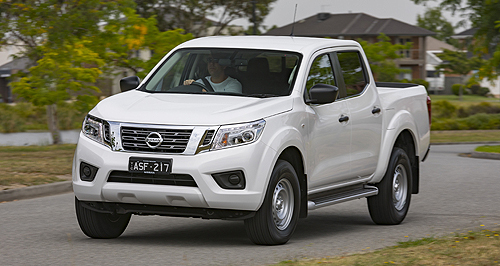Make / Model Search
News - NissanNissan to drop diesel development: reportTrail blazed: Sales of the X-Trail only increased by 0.3 per cent last year, despite being in a growing segment and receiving a mid-life refresh. Diesel development funds to go towards EV technology for Nissan vehicles5 Jun 2018 NISSAN has axed the development of global diesel engine research and development in favour of focusing on electrified powertrain resources, according to Japanese publication Nikkei Asian Review.
The manufacturer has reportedly declared that diesel technology has a limited lifespan in passenger vehicles, as governments across the world mull bans on diesel-powered vehicles in urban centres.
Currently, only two diesel engines can be found in Nissan models in Australia – a 2.0-litre unit in the X-Trail medium SUV and the 2.3-litre unit powering the Navara pick-up range – both of which have been co-developed by alliance partner Renault.
Both engines are expected to be deleted next decade, which should align with the arrival of the next-generation Navara. Renault has also announced it has plans to end new diesel engine development.
Nikkei Asian Review has said that Nissan will continue to sell light-commercial vehicles (LCVs) such as the Navara and other vans with diesel engines, however the powerplants will be sourced from other companies.
It is believed that the next-generation Navara will share its underpinnings with the Mitsubishi Triton, as Mitsubishi was bought by the Renault-Nissan Alliance in October 2016.
The Triton currently uses a 2.4-litre turbo-diesel engine producing 133kW/430Nm, down slightly on the 140kW/450Nm produced in the top-spec twin-turbo Navara.
Alternatively, greener powertrains could also be on the cards for the next Navara, with Nissan discussing the possibility of alternative powertrain technology in LCVs in February at the Nissan Futures event in Singapore.
Speaking to GoAuto at the time, vice-president and alliance global director, general manager of the Nissan Research Centre, Kazuhiro Doi said that there were a number of potential powertrain options to explore.
“I think one of the possible solutions is e-Power-type of electrification,” he said. “We can improve the efficiency of the gasoline engine or diesel engine more by supporting the electrified technologies.”
Nissan’s e-Power system uses an electric motor to drive the wheels, however it relies on a small-capacity combustion engine and regenerative braking to keep the battery pack topped up.
“The other is maybe fuel-cell type of technologies,” he added. “It is ok to use biofuel or it is ok also to use hydrogen. Because in the case of hydrogen, the issue is the distribution. But if that is fleet use, we can have … a hydrogen station for fleet business use.”
Another potential powertrain option floated by Mr Doi was biofuel, however he said that excessive cost made it a tough sell, for now.
“In the case of biofuel, the availability of energy is much, much easier than hydrogen. Maybe in that sense, it may be more practical. And I believe, technology-wise, both (biofuel and hydrogen fuel-cell) of them are possible.
“The question is how we can commercialise it. To commercialise it, we still need to have a breakthrough about the cost. Not only the technology but also the distribution.”
GoAuto has contacted Nissan Australia for comment.  Read more |
Click to shareNissan articlesResearch Nissan Motor industry news |












Facebook Twitter Instagram